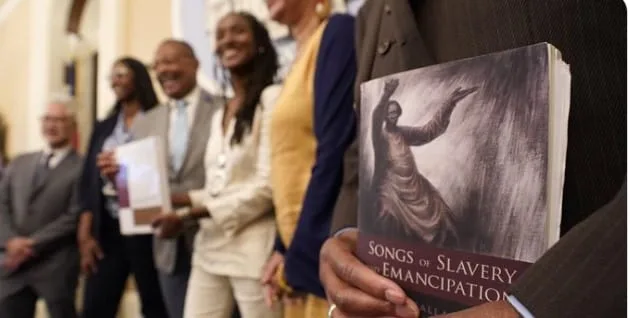
Updated August 22, 2023, 10:15 a.m. PST
- Judge Patrick Robinson, from the International Court of Justice, said the U.K. must make reparations for the transatlantic slave trade.
- In April, Prime Minister Rishi Sunak refused to apologize for the slave trade. Judge Robinson, who presided over the war crimes trial of the former Yugoslav president Slobodan Milošević, said the U.K. must change their position in light of growing international discussions about reparations. He said:
“They cannot continue to ignore the greatest atrocity, signifying man’s inhumanity to man. They cannot continue to ignore it. Reparations have been paid for other wrongs and obviously far more quickly, far more speedily than reparations for what I consider the greatest atrocity and crime in the history of mankind: transatlantic chattel slavery.”
- Judge Robinson was pivotal in producing the Brattle Group Report on Reparations for Transatlantic Chattel Slavery, which concludes that the U.K. is required to pay $24 trillion to 14 countries. Roughly $9.6 trillion is due to Jamaica alone.
- He proposes that payments be made over a 10-25 year period and said:
“I believe that the United Kingdom will not be able to resist this movement towards the payment of reparations: it is required by history and it is required by law.”
Updated July 7, 2023
- The California Reparations Task Force has released its final report, recommending reparations for descendants of enslaved peoples and for survivors of segregation and racial discrimination. In addition to monetary compensation, the task force also recommends reforms in housing, healthcare, policing, education, and criminal justice.
- The report, at 1,100 pages, is the result of two years of public hearings, research, historical analysis, interviews, and data collection by the task force.
- The task force is calling on Democratic Gov. Gavin Newsom and state lawmakers to approve financial compensation for California’s Black residents. The compensation will be for harms caused by slavery, mass incarceration, environmental racism, racist policing and profiling, housing discrimination, and inequities in health care and reproductive care.
- Cheryl Grills from the task force said:
“I would encourage the Supreme Court to read the interim report. I would encourage them to read the final report and to understand that the legacy of enslavement, the ongoing harms are with us to this very day. And so, this country is disingenuous. First, they used race to exclude us, and now they’re refusing to use race to include us.”
“By no stretch of the imagination do I believe this will be a cakewalk. It’s going to require some real massaging and networking, working our colleagues to get them to first read the report, accept what’s there and tackle legislation to address this.”
Updated March 30, 2023
- Cities across the U.S., and the state of California, are considering reparations for the descendants of enslaved people, but many Americans are opposed to the idea.
- Supporters and activists hope this will lead to a national compensation policy, but decades of lobbying have failed to convince the two-thirds of Americans who disagree with reparations.
- Demographically, most White, Latino, and Asian Americans oppose reparations, while 86% of Black Americans support them. Nearly 64% of Democrats support reparations, while 90% of Republican voters oppose them.
- University of Massachusetts professor Tatishe Nteta, who conducts polling on the topic, said:
“A plurality of Americans don’t believe the descendants of slaves deserve reparations.”
“Disturbingly – and in spite of indisputable evidence of the continuing effects of slavery and Jim Crow on blacks – the primary stated reason for this opposition is the perception that descendants of enslaved people are not deserving of reparations.”
- The resistance to reparations comes at a time of growing backlash against critical race theory and polarized thinking on the history of Black people in America. There is also, often, an inherent cognitive dissonance — those opposed to reparations tell the ancestors of enslaved Americans that they should “get over it” while simultaneously flying the Confederate flag and decrying any efforts to remove Confederate generals.
- Nteta found that financial considerations are not the key factor for opponents of reparations. He discovered that opponents believe it is “impossible to place a monetary value on the impact of slavery” and that “African Americans are treated equally in society today” as reasons for their opposition.
- One opponent interviewed by NPR said:
“The generation that would be paying for it have nothing to do with what was done in the past. And then you’re paying people that have nothing to do with it in the past.”
“We’re all immigrants at some point, whether it was voluntary or forced and nobody needs a handout anymore. Everybody, you know, pulls themselves up by their own bootstraps and works for a living and makes their way in this world.”
“A majority of our sample tends to think that we’ve made steady progress towards greater equality in wealth between families, so between black and white families. That is totally inconsistent with reality.”
What’s the story?
- California’s Reparations Task Force has proposed reparations for Black residents who have been intergenerationally impacted by slavery, and the payments could be up to $223K per person.
What is the task force working on?
- Last Wednesday, the task force began deliberations to assess how to calculate reparations and who to include within the scope of compensations. They met in Oakland, the birthplace of the militant Black Panther movement and a city with a long history of civil rights activism.
- Governor Gavin Newsom has been at the forefront of plans to compensate Black Californians for decades of institutionalized racism after he created the task force in 2020.
- In advance of their meeting, a consulting panel offered the task force projections of over $200K per Black resident if the state wants to truly make reparations for generations of housing discrimination.
What is the task force including in the Reparations Act?
- The task force has not yet created a framework on who qualifies, and the parameters are complex. Many vocal reparations advocates are working to achieve compensation for all Black residents. However, the task force voted this year to limit reparations to descendants of enslaved Black people as of the 19th century.
- The task force is analyzing five key areas where discrimination has affected Black residents: government appropriation of property, housing discrimination/homelessness, health outcomes, devaluation of Black-owned businesses, and mass incarceration.
What’s next?
- The task force must complete its final report and recommendations by the July 1, 2023, deadline. Lawmakers will need to pass all relevant legislation for payments to come into effect.
- A federal slavery reparations bill has stalled since its introduction in 1989, and observers doubt it will gain momentum or pass, leaving cities and states to take action on their own.
- Last Wednesday, Boston city councilors decided to take a closer look into their own history and participation in the slave trade.
- Evanston, Illinois, became the first city to make reparations available for Black residents last year.
Should more cities and states be following suit with reparations legislation of their own?
—Emma Kansiz
(Photo Credit: Twitter/LA Times)


